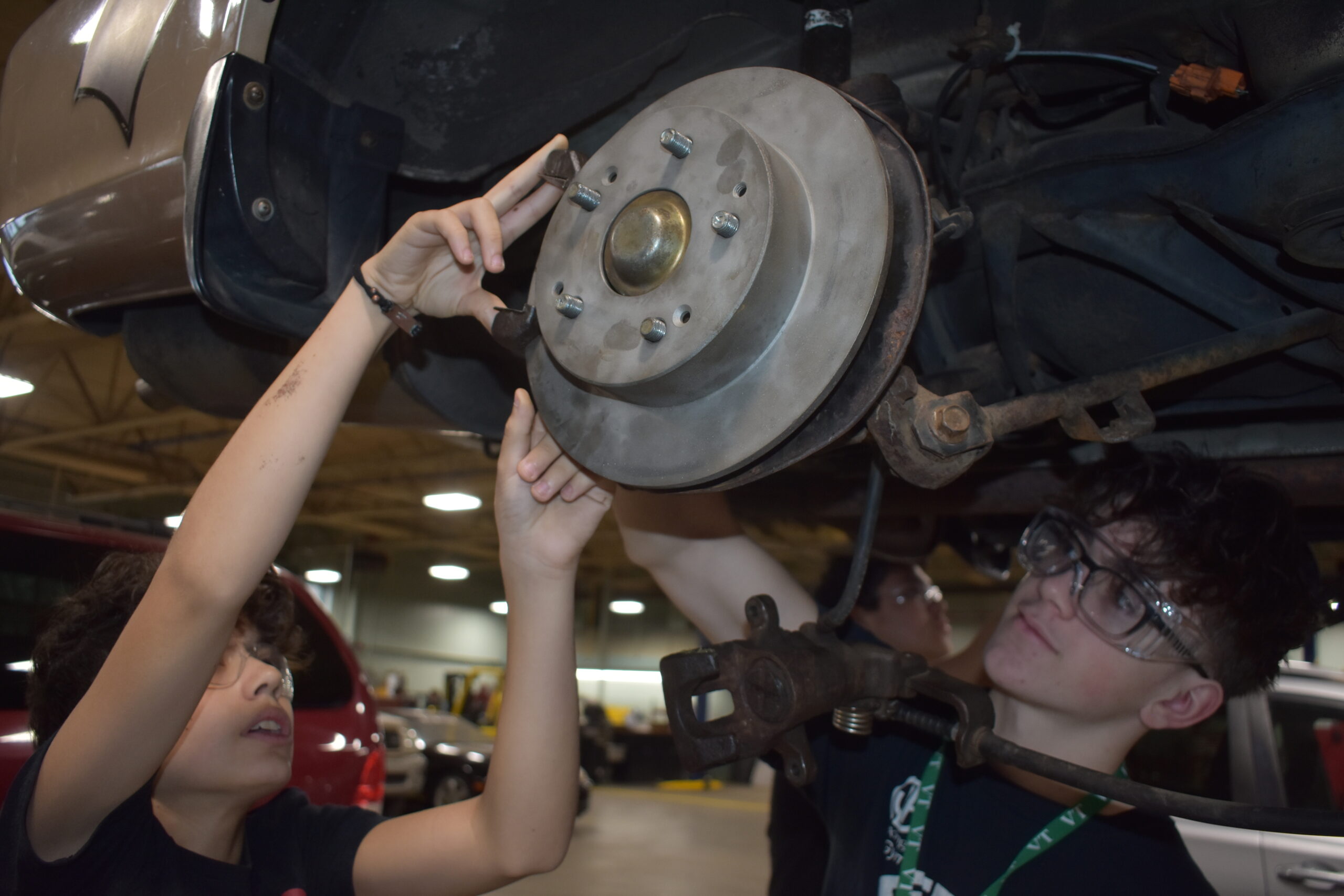CVTE
Automotive Technology
Guy Shepherd, Academy C Administrator – Ext. 113
Course & Program of Studies
Statement of Purpose
The Automotive Technology program at GNBRVTHS is committed to providing students with a comprehensive education that prepares them for successful careers in the automotive industry. By combining technical training with academic subjects, the program ensures that students are well-rounded and ready for future challenges.
Key Program Features:
- Hands-On Training: Students gain practical experience working on a variety of vehicles, including cars, trucks, and motorcycles.
- Industry-Standard Equipment: Access to state-of-the-art automotive equipment and tools.
- Safety Training: Emphasis on safety practices and OSHA regulations.
- Technical Skills: Development of skills in areas such as engine repair, electrical systems, brake systems, and suspension systems.
- Diagnostic Skills: Training in diagnostic techniques using advanced diagnostic tools.
- Career Pathways: Guidance on career paths in the automotive industry, including technician, service advisor, and automotive sales.
By completing the Automotive Technology program, students will be well-prepared to enter the workforce or pursue further education in automotive technology or related fields.
Exploratory Program
The Freshman Automotive Technology Exploratory program provides an introduction to the exciting world of automotive technology. Students will gain hands-on experience with basic automotive tasks, including:
- Vehicle Safety: Learning proper safety procedures, including lifting and securing vehicles.
- Basic Maintenance: Performing routine maintenance tasks like oil changes and tire rotations.
- Tool Usage: Practicing the safe and effective use of automotive tools and equipment.
- Automotive Systems: Gaining a basic understanding of automotive systems, such as engine, electrical, and braking systems.
Through a combination of hands-on work and classroom instruction, students will develop a strong foundation in automotive technology and be prepared to advance to more complex tasks in their sophomore year.
Freshman Program
The Freshman Automotive Technology program provides a solid foundation in automotive repair and maintenance. Key areas of focus include:
- Basic Automotive Maintenance: Performing routine maintenance tasks, such as oil changes and tire rotations.
- Tool Usage: Safely and effectively using hand tools and power tools.
- Vehicle Systems: Gaining a basic understanding of automotive systems, including the engine, transmission, electrical, and braking systems.
- Diagnostic Tools: Learning to use diagnostic tools to identify and troubleshoot vehicle problems.
- Safety Practices: Adhering to safety protocols and regulations in the automotive shop.
By the end of the freshman year, students will be well-prepared to advance to more complex automotive tasks in their sophomore year. They will also have a strong foundation in automotive safety and the use of industry-standard tools and equipment.
Sophomore Program
The Sophomore Automotive Technology program builds upon the foundational knowledge and skills acquired in the freshman year. Key areas of focus include:
- Suspension Systems: Understanding the components and functions of suspension systems, including shocks, struts, springs, and control arms.
- Braking Systems: Learning about the different types of braking systems, diagnosing brake problems, and replacing brake components.
- Wheel Alignment: Mastering wheel alignment procedures to ensure proper vehicle handling and tire wear.
- Advanced Diagnostic Techniques: Utilizing advanced diagnostic tools to identify and troubleshoot complex vehicle issues.
- Safety Procedures: Adhering to safety protocols and regulations, including the proper use of lifting equipment and hazardous materials.
Through hands-on training and classroom instruction, students will develop the skills and knowledge needed to work as automotive technicians.
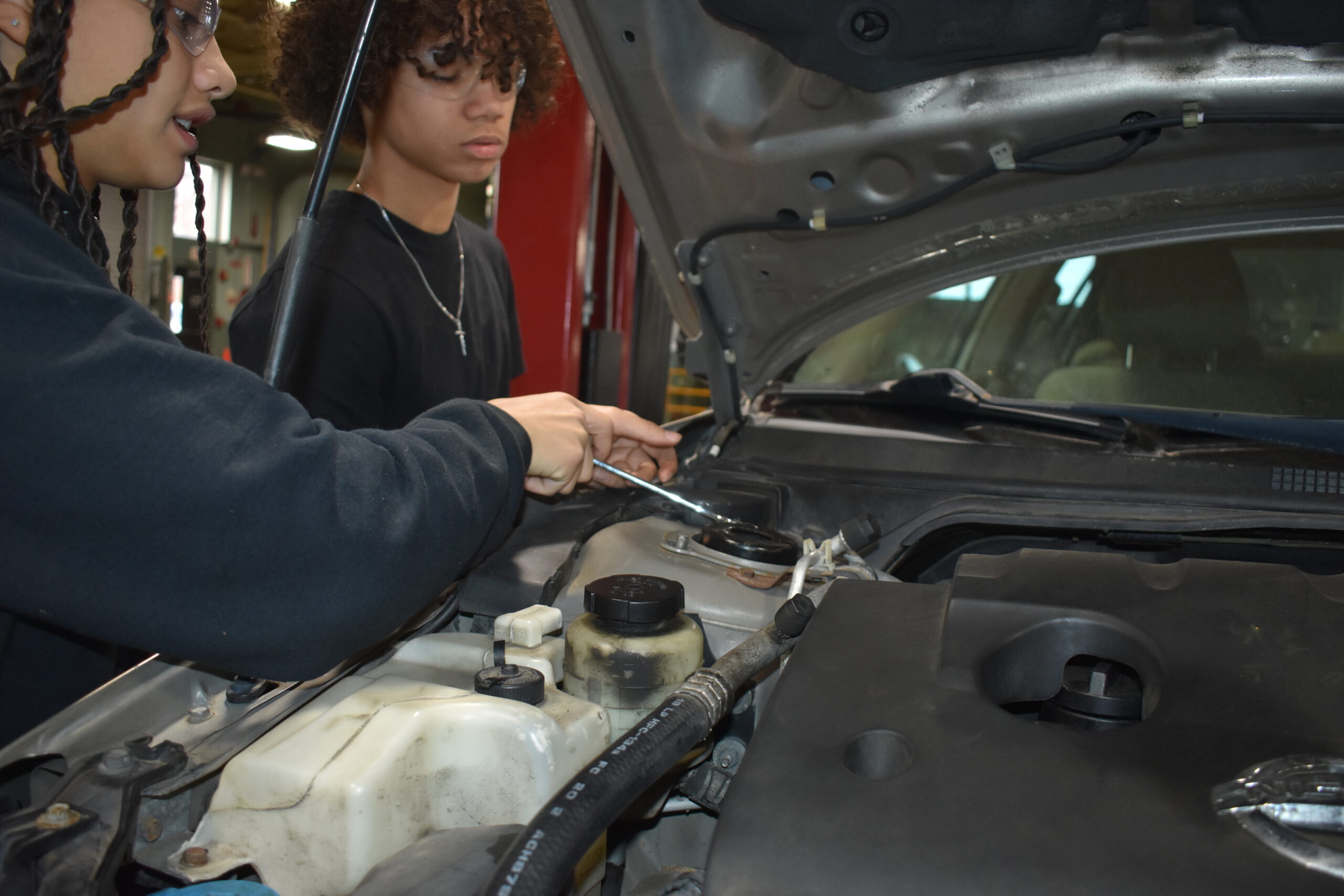
Sophomore Related 1
Automotive Science Related
The Junior Automotive Technology course delves into the complexities of automotive systems, including braking, steering, and suspension. Key topics include:
- Braking Systems:
- Understanding the components of hydraulic and electronic brake systems
- Diagnosing and repairing brake problems
- Bleeding brake systems
- Replacing brake pads and rotors
- Steering Systems:
- Analyzing power steering systems
- Aligning vehicles
- Replacing steering components
- Suspension Systems:
- Inspecting and replacing suspension components
- Diagnosing and repairing suspension issues
Students will gain hands-on experience working on real vehicles, using industry-standard tools and equipment. By the end of the junior year, students will have a deep understanding of these critical automotive systems and be well-prepared for advanced training in their senior year.
Sophomore Related 2
Applied Automotive Math
The Automotive Electrical Math course provides students with the mathematical skills necessary to excel in automotive electrical systems. Key topics include:
- Basic Algebra: Solving equations, working with formulas, and understanding algebraic concepts.
- Percentages: Calculating percentages, discounts, and markups.
- Ohm’s Law: Applying Ohm’s Law to analyze electrical circuits.
- Electrical Resistance: Calculating the resistance of wires and components.
- Circuit Analysis: Analyzing series, parallel, and combination circuits.
- Electrical Troubleshooting: Using mathematical calculations to diagnose electrical problems.
By mastering these mathematical concepts, students will be better equipped to understand and troubleshoot complex automotive electrical systems.
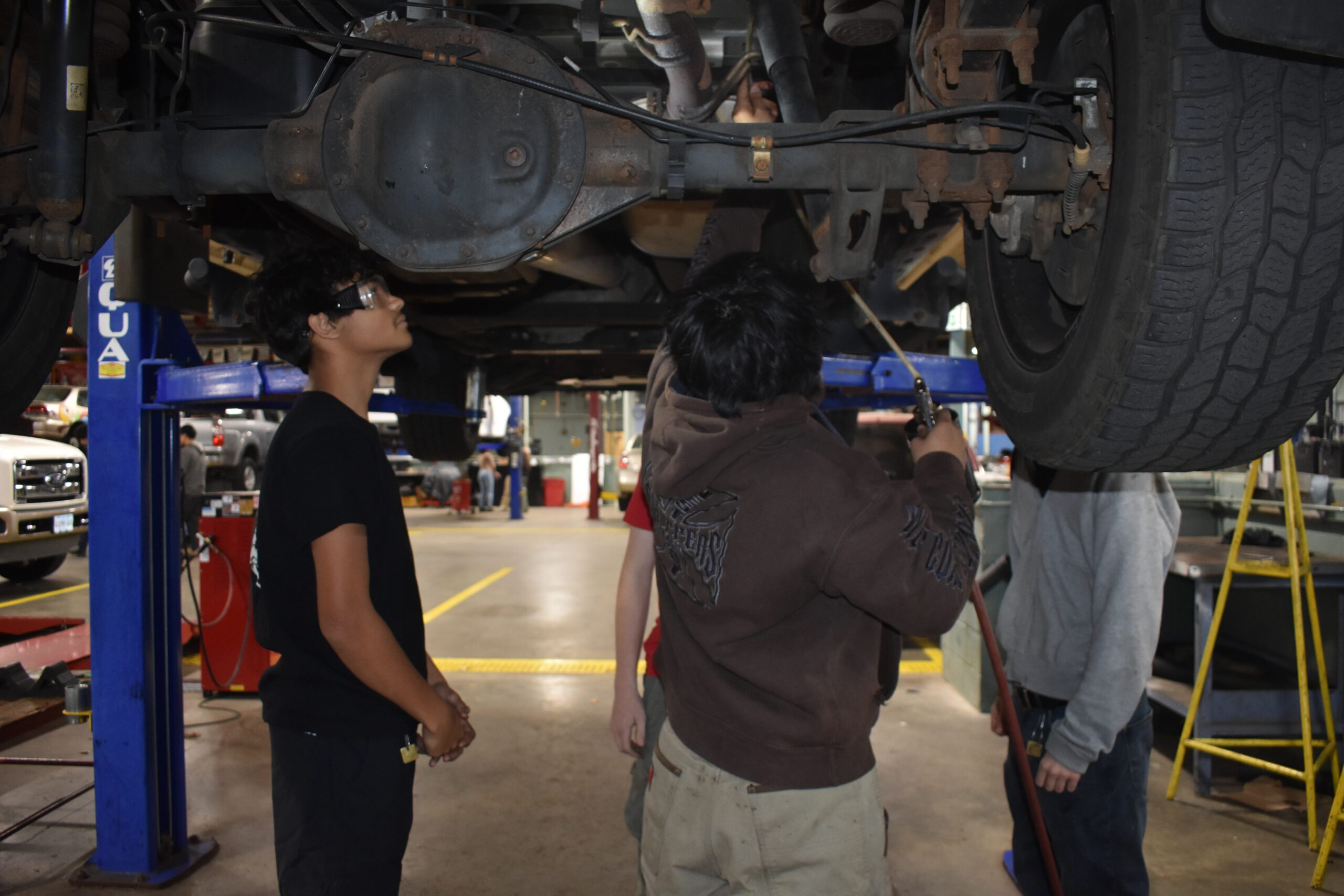
Junior Program
The Junior Automotive Technology program delves into advanced automotive systems, including electrical, HVAC, and hybrid technology. Key areas of focus include:
- Automotive Electrical Systems:
- Diagnosing and repairing electrical components, such as alternators, starters, and sensors.
- Reading and interpreting wiring diagrams.
- Troubleshooting electrical issues using diagnostic tools.
- HVAC Systems:
- Understanding the principles of heating and air conditioning systems.
- Diagnosing and repairing HVAC components, including compressors, condensers, and evaporators.
- Performing refrigerant handling and recovery procedures.
- Hybrid Technology:
- Learning about the basics of hybrid technology, including battery systems, electric motors, and power electronics.
- Diagnosing and repairing hybrid vehicle components.
By the end of the junior year, students will have a comprehensive understanding of these advanced systems and be well-prepared for their senior year, where they will focus on even more complex automotive technologies.

Junior Related 1
Automotive Electrical Theory
The Junior Automotive Electrical course provides students with a deep understanding of automotive electrical systems. Key topics include:
- Basic Electrical Principles: Ohm’s Law, Kirchhoff’s Laws, and circuit analysis.
- Automotive Electrical Systems:
- Battery systems
- Charging systems
- Starting systems
- Lighting systems
- Ignition systems
- Electronic Fuel Injection Systems:
- Fuel injection components and operation
- Engine control modules (ECMs)
- Diagnostic trouble codes (DTCs)
- Hybrid Vehicle Technology:
- Introduction to hybrid vehicle systems
- Battery technology and charging systems
- Hybrid powertrain components
Students will gain hands-on experience diagnosing and repairing electrical systems using advanced diagnostic tools and equipment. By the end of the course, students will be well-prepared to work on modern vehicles with complex electrical systems.
Junior Related 2
Applied Automotive Math
The Junior Automotive Electrical Mathematics course provides students with the mathematical skills necessary to succeed in automotive electrical systems. Key topics include:
- Basic Math: Review of basic arithmetic operations, including addition, subtraction, multiplication, and division.
- Algebra: Solving equations, working with formulas, and understanding algebraic concepts.
- Geometry: Applying geometric principles to measure and calculate angles, distances, and areas.
- Trigonometry: Using trigonometric functions to solve problems involving triangles.
- Electrical Calculations: Applying Ohm’s Law and Kirchhoff’s Laws to calculate voltage, current, and resistance in electrical circuits.
- Unit Conversions: Converting between different units of measurement, such as inches, millimeters, and volts.
By the end of the course, students will be able to apply mathematical principles to real-world automotive electrical problems, such as diagnosing electrical faults, calculating wire sizes, and determining component values.

Senior Program
The Senior Automotive Technology course focuses on advanced engine repair and performance techniques. Key areas of focus include:
- Engine Disassembly and Assembly: Disassembling and reassembling engines, including timing belt/chain replacement, valve adjustments, and piston ring replacement.
- Engine Diagnosis: Using advanced diagnostic tools to diagnose engine performance problems, such as misfires, lack of power, and excessive emissions.
- Engine Performance: Tuning engines for optimal performance, including camshaft timing, valve timing, and fuel injection calibration.
- Engine Repair: Repairing engine components, such as cylinder heads, blocks, and connecting rods.
- Engine Rebuilding: Rebuilding engines to factory specifications or performance specifications.
Through hands-on training and classroom instruction, students will develop the skills and knowledge needed to become skilled automotive technicians. They will be prepared to work on a wide range of vehicles, from classic cars to high-performance vehicles.
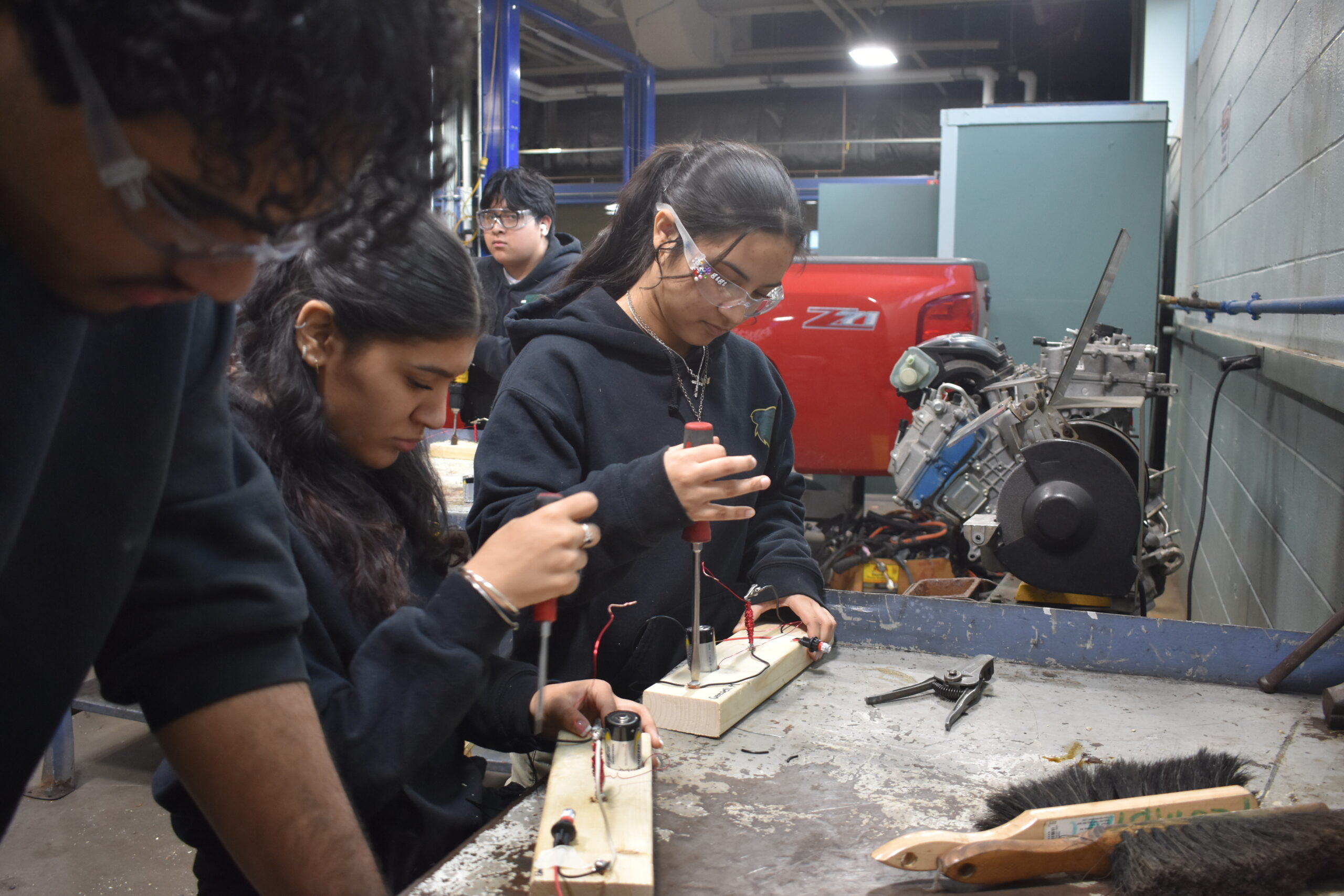
Senior Related 1
Automotive Engine and Electrical Control Systems
This course provides a comprehensive understanding of modern automotive engine and electrical control systems. Key topics include:
- Engine Control Modules (ECMs): Understanding the role of ECMs in controlling engine functions.
- Sensor and Actuator Systems: Learning about various sensors (e.g., MAF, MAP, TPS) and actuators (e.g., injectors, ignition coils) and their interactions with the ECM.
- Diagnostic Trouble Codes (DTCs): Interpreting DTCs to diagnose and repair vehicle issues.
- Scan Tool Usage: Using advanced diagnostic tools to analyze vehicle data and perform system tests.
- Hybrid and Electric Vehicle Technology: Gaining an understanding of hybrid and electric vehicle systems, including battery technology, electric motors, and power electronics.
By the end of the course, students will be able to diagnose and repair complex automotive electrical and engine control systems, making them well-prepared for careers in the automotive industry.
Senior Related 2
Automotive Senior Lab – Elective
The Senior Automotive Technology Lab course provides students with advanced hands-on experience and reinforces the theoretical knowledge gained in previous courses. Key areas of focus include:
- Complex Vehicle Repairs: Diagnosing and repairing complex automotive issues, such as transmission failures, engine rebuilds, and electrical system malfunctions.
- Advanced Diagnostic Techniques: Utilizing advanced diagnostic tools to identify and troubleshoot problems.
- Hybrid and Electric Vehicle Technology: Gaining hands-on experience working on hybrid and electric vehicles.
- Customer Service: Developing strong customer service skills, including effective communication and problem-solving.
- Shop Management: Understanding the principles of shop management, including inventory control, scheduling, and estimating.
By the end of the senior year, students will be well-prepared to enter the workforce as skilled automotive technicians. They will have the knowledge, skills, and certifications to succeed in a variety of automotive careers.
Certifications
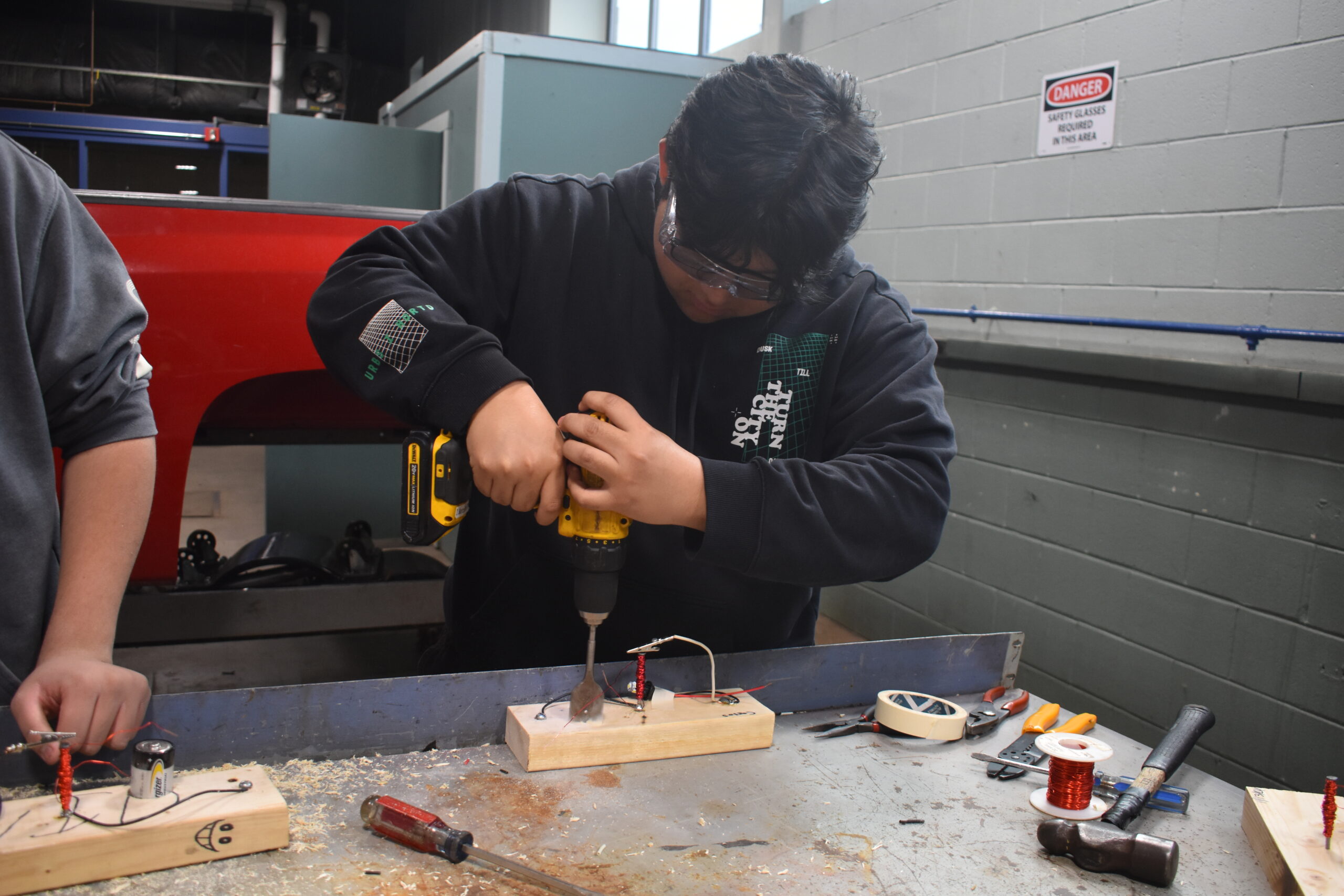
- OSHA 10
- ALI Automotive Lift Certification
- SnapO Meter Certification
- EPA 609 Refrigerant
- Alldata Certificated Auto Information Specials
- ASE Refrigerant
- ASE Service Technician
- ASE Brakes – Auto
- ASE Electrical Systems
- ASE Engine Performance
- ASE Engine Repair
- ASE Heating and Air Conditions
- ASE Maintenance and Light Repair
- ASE Manual DriveTrain and Axles
- ASE Suspension and Steering
- ASE 1 Engine Repair
Career Opportunities
- Technician
- Service Department Consultant
- Parts Department Consultant
- Fleet Service Technician
- Service Station Attendant
- Foreman
- Service Manager
- Parts Department Manager
- Fixed Operation Manager
- Finance/Insurance Manager
- Sales Manager
- General Manager
- Insurance Adjuster
- Automotive Manufacturer Representative
- Vocational Teacher
- Automotive Mechanical Engineer
- Automotive Design Engineer
- Automotive Research and Development Engineer
Post-Secondary Education
- University of Northwestern Ohio
- Massachusetts Community Colleges
- New England Institute of Technology
